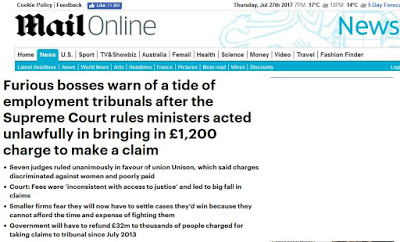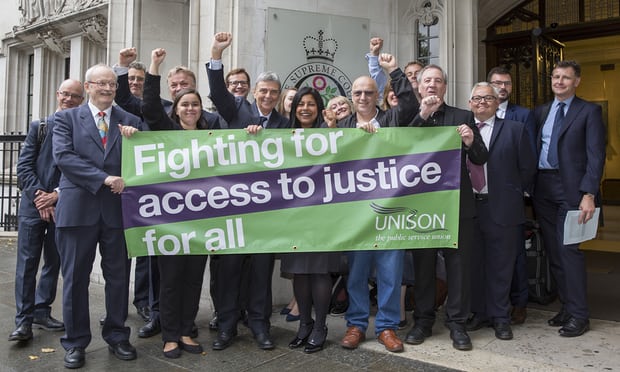Grenfell Inquiry Judge Moore-Bick Rejected UNISON’s Application at the Court of Appeal
I must confess that I have a
personal interest in the historic judgment of the Supreme Court to overturn the
introduction of penalty fees aimed at deterring applications to Employment Tribunals. Before illness forced me into retirement in
2013 I had spent over a decade representing clients in Employment Tribunals and
the Employment Appeal Tribunal on behalf of Brighton Unemployed Workers Centre. Far from most workers submitting vexatious
claims my experience was that most people were loath to go through a tribunal hearing
if they could avoid it. It puts a great
strain on most people. Vexatious claimants can be easily barred but my experience was that rogue employers would and did everything to cheat employees out of their rights. The Tory Government, with the active collusion of the Lib Dems, sought to prevent people exercising their lawful rights.
The Lib Dems and Jo Swinson now claim that they were taken by surprise at the drop in employment cases. Only an idiot or a fool could have thought that the level at which fees were set would have no effect on tribunal applications.
succeed in Employment Tribunal cases.
Most cases are settled out of court. In discrimination cases in particular, levels
of success are as low as 20%. It is
very difficult proving that an employer sacked you because you are a woman
or disabled or pregnant or because you
were a member of a trade union. The employer’s argument would be that the person wasn’t good at their job or that they were no longer needed. Very few people admit to discriminating. Employers have always had the cards stacked
in their favour as very few employees are willing to give evidence against an employer
if they are still working for them. British judges are notorious for twisting the law in favour of the employer. E.g. the Reverse Burden of Proof Regulations which were intended to make it easier for victims of discrimination have had almost no effect because of the way the judiciary has interpreted them.
 |
| A whistleblowing case I won at the EAT – it would have cost £2800 to bring the case if fees had existed |
local Brighton charity, the Deans Youth Project, who revealed that the organisation was being systematically defrauded. When she told the trustees, one of whom Dee Simson was a
local Conservative councillor, they decided to sack the whistleblower and protect the person
who had raked in thousands of pounds through false invoicing! It took a 3 day tribunal with 3 other Conservative councillors giving evidence for us before the Tribunal unanimously
finding in our favour.
unfairly or because you were pregnant or failed to pay you holiday pay then before
July 2013 you could make an immediate application to an Employment Tribunal and
if you failed there you could appeal to the Employment Appeal Tribunal. In a discrimination cae you could also submit a Questionnaire to the employer asking why they discriminated against you. The Tories and the Lib Dems abolished this, extended the period before you could claim unfair dismissal to two years and introduced a raft of other provisions that reduced compensation and put other hurdles in employees place. However the introduction of Tribunal fees by the
Business Secretary Vince Cable and Jo Swinson meant that for most people it wasn’t worth paying a small fortune to a Tribunal that was likely to find against you on procedural or other grounds.
 |
| The Daily Mail warns of a ‘tide of employment tribunal claims’ a change from a ‘tide’ of immigrants |
of wages claims would cost £390 to get into tribunal which meant that the
lowest paid simply couldn’t afford to issue a claim especially as they would
often be claiming less than that amount. You therefore had the right to things like 28 days holiday pay, maternity pay etc. but if you can’t enforce your rights then they are nugatory.
 |
| The reduction in claims since the introduction of fees – it took some effort to say nothing of hostility to workers rights to ignore the evidence |
£1,200 pounds to have a Tribunal hearing, a figure which deterred some 80% of
people from even putting in claims. If
you didn’t have a trade union backing you or you didn’t get a high salary the
chances were you had to forego your rights.
It cost even more, £1600, to put in an appeal to the EAT. I won five cases at the EAT, which was the High
Court for employment cases, but I doubt if any of my clients could have
afforded £1,600.
 |
| Lib Dems Vince Cable Introduced Tribunal Fees |
been a right-wing pro-austerity business party. It was therefore natural that they should go
into coalition with the Tories in 2010. Whether
it was the Bedroom Tax, the Privatisation of the NHS, Student Fees or
Austerity, the Lib Dems played the part of the Tories loyal partners from
2010-2015.
 |
| Jo Swinson, Lib-Dem Deputy Leader – introduced fees and now opposes them! |
Dems Deputy Leader, issued a press release in 2013 supporting
the introduction of tribunal fees and as Under Secretary of State for Employment
Relations she spoke in the House of Commons in
favour of them! Ed Davey was
another Lib Dem Minister who played his part in the introduction of these fees.
these opportunistic hypocrites after UNISON’s victory in the Supreme Court after
four years litigation? In the Daily Mail
we have Jo Swinson, the Lib Dem’s deputy leader quoted
as saying that ‘This is a landmark victory for
workers and for access to justice.’ Yes
it is indeed a landmark victory and a judgment that will be remembered for
years for the way in which it embraced broad principles of the right to justice
for those without means. But it was also a judgment against the decisions that she made when she was an employment minister.
 |
| Grenfell Tower Judge Moore-Bick headed the Court of Appeal decision to ignore the evidence in favour of their class interests |
down the bedroom tax the Lib Dems would welcome that too as a victory! Only a party without a shred of principle
could welcome a judgment which overturns their own previous policies in government.
Dem you find a Tory underneath.
Historically the Liberals were as reactionary as the Tories. It was the Liberals under Asquith who led the
opposition to womens’ suffrage and introduced the Cat and Mouse Act. It was Lloyd George who introduced the Black
and Tans into Ireland and threatened a carnival of violence if the Partition of
Ireland wasn’t accepted.
 |
| Whistleblowing case which unearthed naked corruption in New Labour inner city regeneration scheme |
especially given that three times in the past four years the High Court and the
Court of Appeal have rejected the attempt by UNISON to have the fees declared
unlawful. I have to confess that when I
first read the Court
of Appeal judgment in the case in 2015 I was quite amazed by the quality of
the arguments used in justification of the decision to reject UNISON’s
application. The Judges, including Sir Martin Moor-Bick went out of their way not to have to find in favour of UNISON.
a reduction of the order of 80% in the number of people making claims then the
introduction of fees quite clearly were deterring people from putting in
claims. Not only was this an obstacle to
obtaining justice but it breached the European legal principle of
Effectiveness, that is they made it impossible to enforce one’s legal rights.
miserable nitpicking approach that is typical of the lead judge Lord Underhill, a former President of the EAT and a judicial pedant. In Para
67 it ruled that:
yes, the introduction of fees had deterred people from making claims but it can
be put down to the fact that it is inevitable that people will not exercise
their rights when it costs them to get into tribunal! That was precisely the point that UNISON were making, that when a tribunal is not free people don’t apply yet the Judges, Moor-Bick among them were happy to find the slightest pretext to avoid the obvious. In their Poor Law approach they
cite the decision of the High Court that:
with limited means and that they may have to use hard-earned savings is not
enough. But it is not possible to identify any test for judging when a fee
regime is excessive. It will be easier to judge actual examples of those who
assert they have been or will be deterred by the level of fees imposed.”
that there was an ‘irresistible inference’ that the tribunal fees were
deterring claimants, the Court of Appeal was determined to make it impossible
to prove such a case. Instead of looking
at broad overarching principles
both Divisional Courts, I have a strong suspicion that so large a decline is
unlikely to be accounted for entirely by cases of “won’t pay” and
that it must also reflect at least some cases of “can’t pay”; and I
have accordingly been tempted by Ms Monaghan’s submission that the figures
speak for themselves. But in the end I do not think that that is legitimate.
The truth is that, looked at coolly, there is simply no safe basis for an
untutored intuition about claimant behaviour or therefore for an inference that
the decline cannot consist entirely of cases where potential claimants
could realistically have afforded to bring proceedings but have made a choice
not to.
this tortured logic is the almost painful way the Court of Appeal struggled to
find a way of avoiding the obvious inference from an 80% drop in claimants. In essence what they were saying is that claimants
chose not to pay tribunal fees because they spent their money on clothes, going
out or heaven forbid drinking alcohol. Working
class people are expected to be abstemious and save up for months at a time (despite there being a 3 month limit on making most claims!).
three judges who were quite happy with this anti-working class clap trap was
one Lord Justice Moore-Bick, who happens to be the judge who has been chosen to
chair the Inquiry into Grenfell Tower.
Yet again it would appear that when given the choice, Moore-Bick demonstrates
no sympathy at all with the poor. It is
yet another reason to campaign to remove this upper class reptile from the
Grenfell Tower inquiry.


